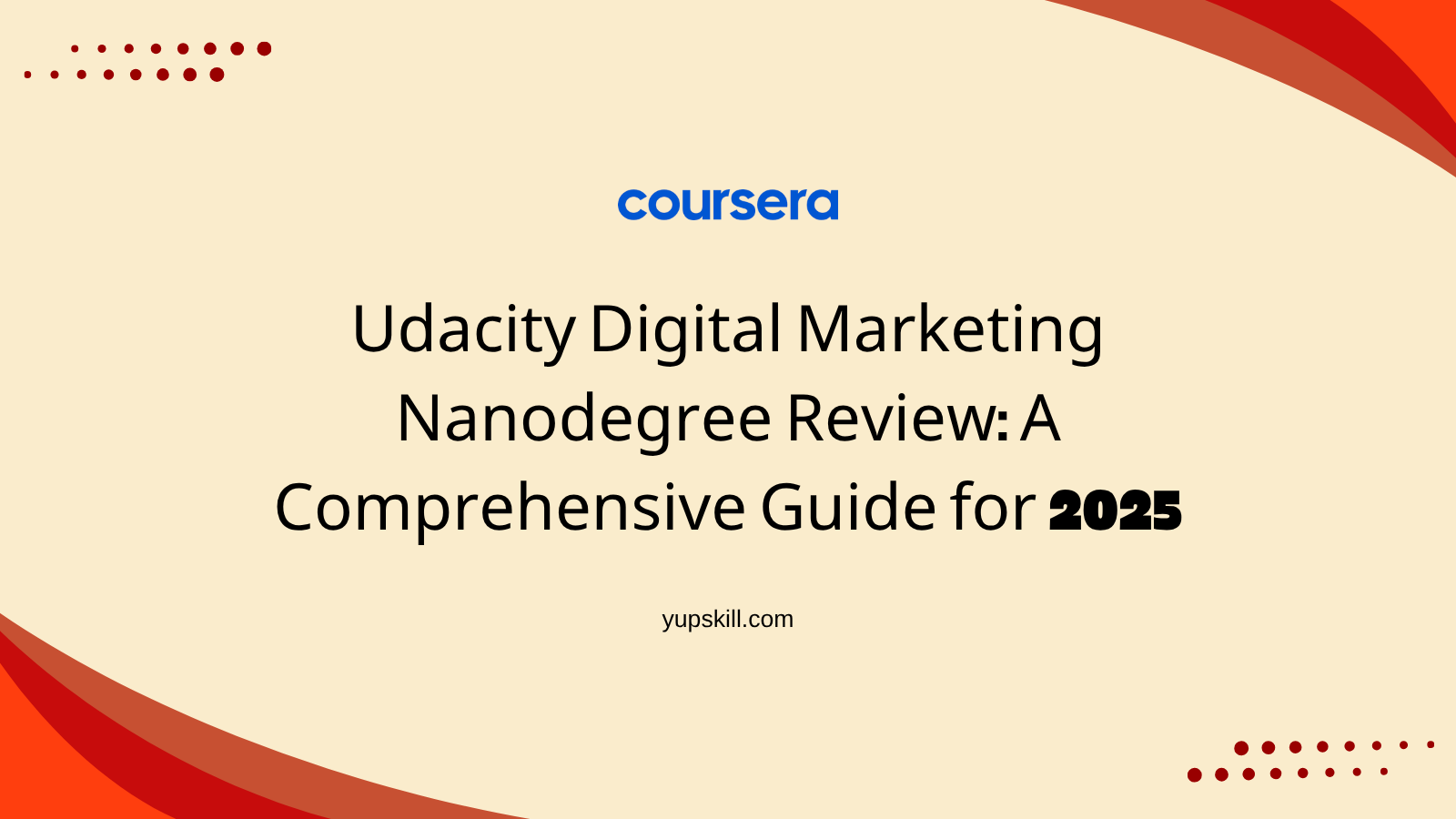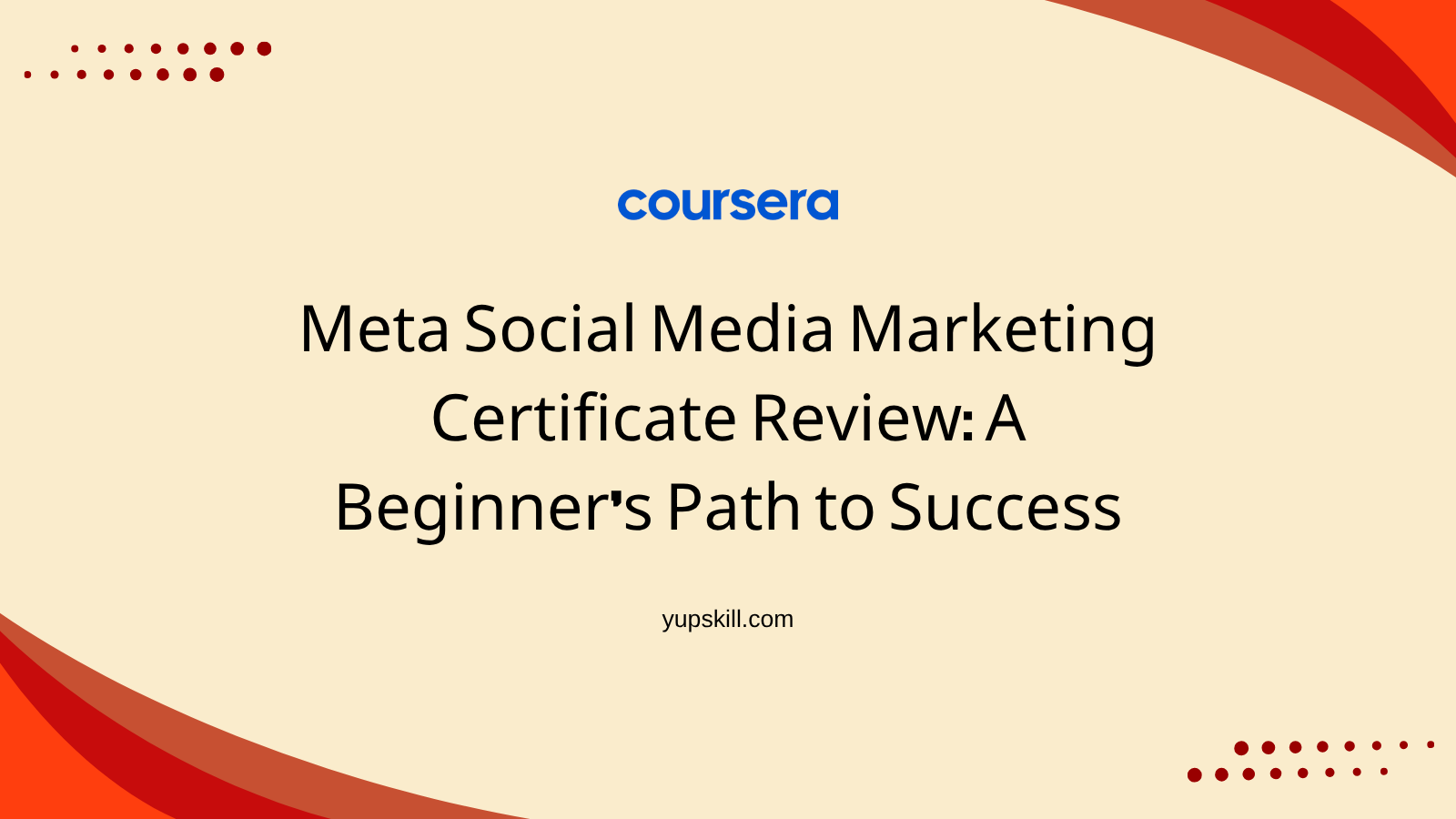Coursera has been a significant player in the online education landscape since its creation in 2012. Founded by Stanford professors Andrew Ng and Daphne Koller, the platform has grown exponentially, collaborating with over 300 leading universities and companies worldwide.
With a catalog of over 7,000 courses, certificates, and degree programs, Coursera offers diverse learning opportunities for individuals across the globe. But with numerous online education platforms now available, the question arises: Is Coursera still the best choice for learners in 2025?
In this comprehensive review, we will explore Coursera’s strengths, weaknesses, and the details of its pricing to help you determine if it’s the right platform for you.
What Is Coursera?

Coursera is an online learning platform that connects users with courses, professional certificates, and even full degree programs from prestigious universities and companies. Unlike traditional education, Coursera allows you to learn at your own pace, offering a flexible learning experience suitable for students, professionals, and anyone looking to enhance their skills.
The platform offers courses across a variety of subjects, including computer science, data science, business, personal development, humanities, and more. Learners can choose to audit many of the courses for free, which gives them access to the course materials, lectures, and sometimes assignments. However, in order to gain a certificate or participate in graded assignments, users usually need to pay for the course.
Coursera works with highly recognized universities such as Stanford, Yale, and the University of Michigan, as well as top companies like Google, IBM, and AWS, making the learning experience both academically rigorous and industry-relevant.
It also provides a wide range of professional certificates and degree programs, making it a popular option for those looking to boost their careers or gain formal qualifications.
Top Courses and Specializations: Summary
Here is a table summarizing the Top 10 Courses and Specializations on Coursera based on popularity, learner ratings, and industry recognition:
| Course Name | Provider | Duration | Level | Rating | Description |
|---|---|---|---|---|---|
| Google IT Support Professional Certificate | 6 months (5 hours/week) | Beginner | 4.8/5 | A comprehensive introduction to IT support, including troubleshooting, customer service, and networking. | |
| IBM Data Science Professional Certificate | IBM | 3 months (5 hours/week) | Beginner | 4.7/5 | Covers data analysis, visualization, and machine learning with Python. |
| DeepLearning.AI Machine Learning Specialization | DeepLearning.AI | 3 months (4 hours/week) | Intermediate | 4.9/5 | Learn machine learning techniques including supervised and unsupervised learning. |
| Python for Everybody Specialization | University of Michigan | 5 months (4 hours/week) | Beginner | 4.9/5 | Introduction to programming using Python and learning data structures, databases, and web scraping. |
| Google Project Management Professional Certificate | 6 months (5 hours/week) | Beginner | 4.7/5 | Learn project management fundamentals, including Agile and Scrum methodologies. | |
| Data Science Specialization | Johns Hopkins University | 11 months (7 hours/week) | Intermediate | 4.8/5 | A comprehensive deep dive into data science concepts, including R programming and machine learning. |
| Digital Marketing Specialization | University of Illinois | 8 months (6 hours/week) | Beginner | 4.7/5 | Learn digital marketing techniques covering SEO, social media, and digital analytics. |
| Google IT Automation with Python | 6 months (5 hours/week) | Intermediate | 4.8/5 | Learn Python automation skills focused on IT tasks such as configuration, troubleshooting, and scripting. | |
| AI for Everyone | DeepLearning.AI | 4 weeks (4 hours/week) | Beginner | 4.9/5 | A high-level overview of AI and how it’s applied in different industries. |
| Excel Skills for Business Specialization | Macquarie University | 4 months (5 hours/week) | Beginner | 4.8/5 | Master Excel skills, including data analysis, formulas, and pivot tables for business applications. |
Key Points:
- Beginner Friendly: Courses like Google IT Support and Python for Everybody are perfect for beginners.
- Industry-Relevant: Many of these courses come from top tech companies like Google, IBM, and DeepLearning.AI, offering skills in high demand.
- Practical Learning: Several courses focus on hands-on projects, providing real-world skills that can be directly applied in the workplace.
This table showcases some of the most popular and highly rated courses across various disciplines, helping you to find the best option depending on your learning goals and career aspirations.
Coursera Course Catalog Overview
Coursera provides a vast array of online courses, specializations, professional certificates, and degree programs across various fields. As of 2025, the platform offers:
- 13,195 Courses: Covering topics from business to computer science.
- 1,754 Specializations: Series of courses designed to deepen expertise.
- 213 Professional Certificates: Industry-recognized credentials.
- 53 Degrees: Bachelor’s and Master’s programs from top universities.
Popular Course Categories
- Business: Courses in leadership, marketing, finance, and entrepreneurship.
- Computer Science: Programming, cybersecurity, cloud computing, and software development.
- Data Science: Machine learning, data analysis, and artificial intelligence.
- Health: Public health, mental health, and healthcare management.
- Information Technology: IT support, networking, and system administration.
- Personal Development: Courses on communication, productivity, and personal growth.
Top-Rated Courses on Coursera
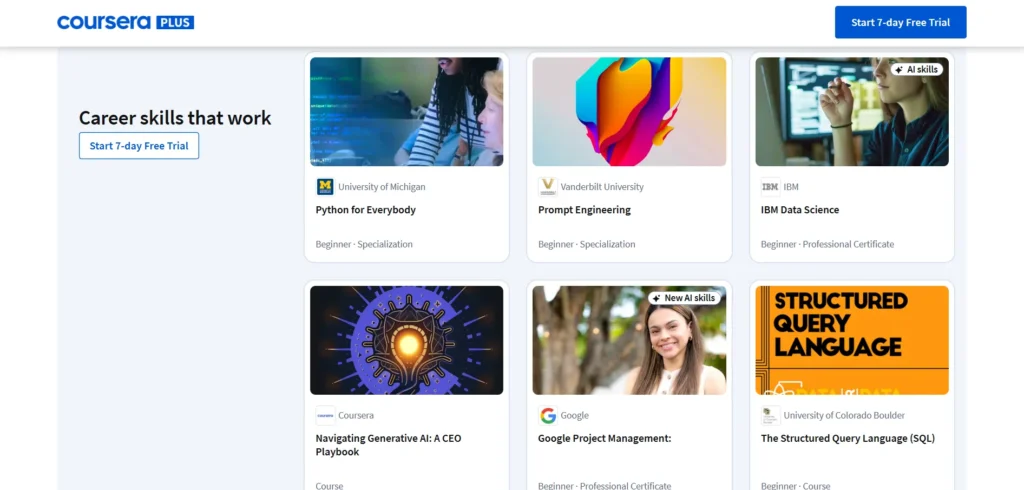
Here are some of the most popular and highly-rated courses:
1. Google IT Support Professional Certificate
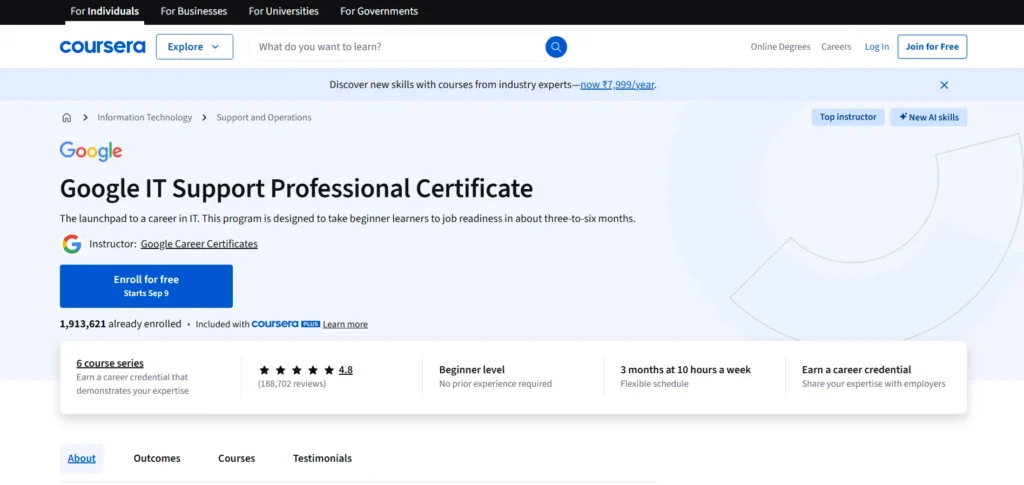
- Provider: Google
- Duration: Approximately 6 months (5 hours/week)
- Level: Beginner
- Description: Prepares learners for IT support roles with hands-on labs and real-world scenarios.
- Rating: 4.8/5
2. IBM Data Science Professional Certificate
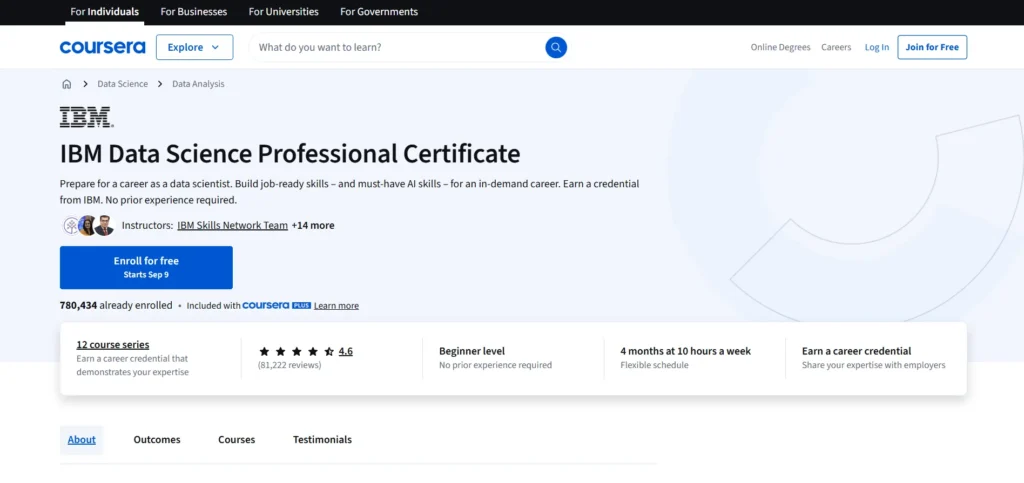
- Provider: IBM
- Duration: Approximately 3 months (5 hours/week)
- Level: Beginner
- Description: Covers data analysis, visualization, and machine learning using Python.
- Rating: 4.7/5
3. DeepLearning.AI Machine Learning Specialization
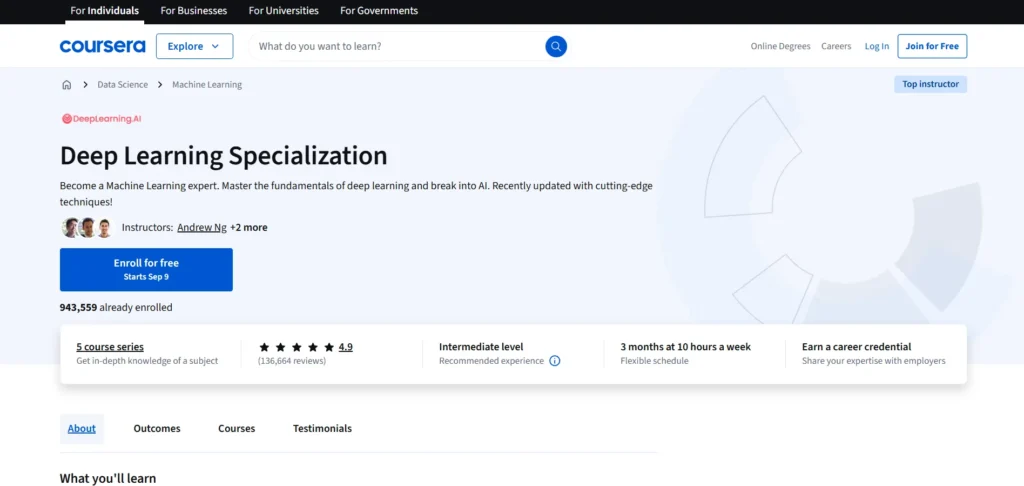
- Provider: DeepLearning.AI
- Duration: Approximately 3 months (4 hours/week)
- Level: Intermediate
- Description: Teaches machine learning algorithms and techniques using Python and TensorFlow.
- Rating: 4.9/5
4. University of Michigan Python for Everybody Specialization
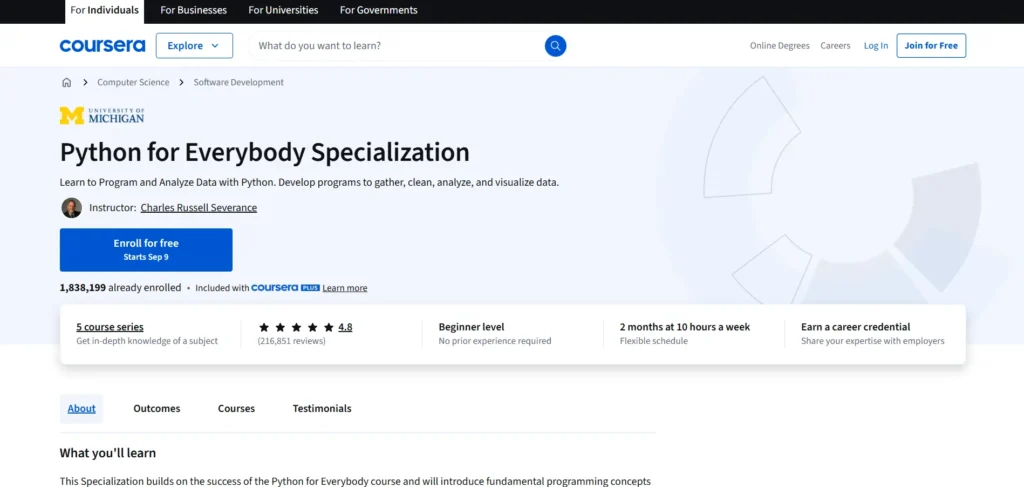
- Provider: University of Michigan
- Duration: Approximately 5 months (4 hours/week)
- Level: Beginner
- Description: Introduces programming using Python, covering data structures, databases, and web scraping.
- Rating: 4.9/5
5. Google Project Management Professional Certificate
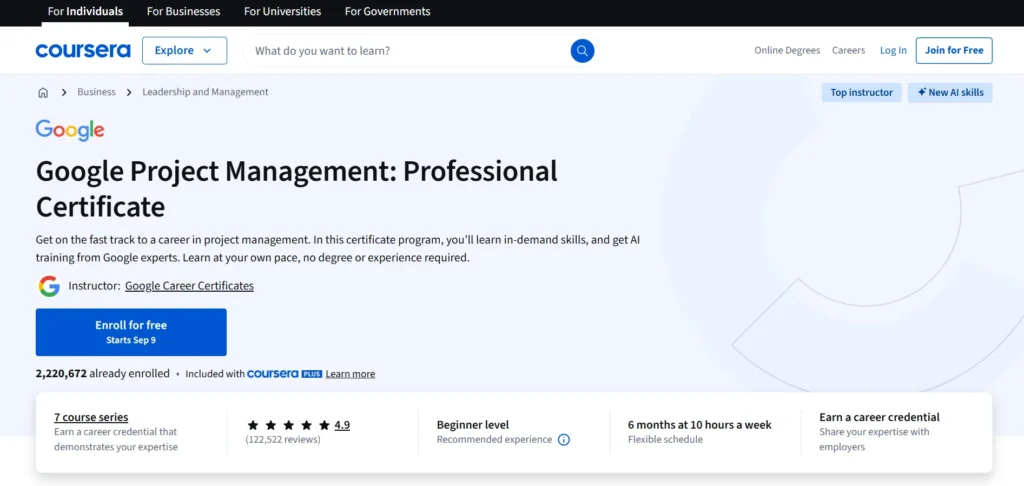
- Provider: Google
- Duration: Approximately 6 months (5 hours/week)
- Level: Beginner
- Description: Provides foundational project management skills, including Agile and Scrum methodologies.
- Rating: 4.7/5
Pricing Breakdown: How Much Does Coursera Cost?
Coursera offers several pricing models, depending on the type of course or program you’re pursuing. Here’s a detailed breakdown of the pricing:
1. Individual Courses
The cost of individual courses typically ranges from $30 to $100. Some high-end courses or specialized topics might cost more, but the price usually falls within this range. If you’re only looking to take one course to explore a new subject or gain a new skill, this can be an affordable option.
2. Specializations and Professional Certificates
Professional certificates and specializations, which consist of a series of courses designed to give you in-depth knowledge of a particular field, can cost anywhere from $39 to $79 per month. The duration of these programs varies, but many can be completed in 3 to 6 months.
If you’re enrolling in a long-term specialization, your monthly subscription will continue until you complete the program. It’s essential to check the course description to get an estimate of the total cost based on how long it might take you to finish.
3. Coursera Plus Subscription
Coursera offers a subscription plan called Coursera Plus. This plan provides unlimited access to over 7,000 courses, specializations, and professional certificates for a flat rate of $399 per year. For learners who plan to take multiple courses, Coursera Plus offers significant savings compared to paying for each course individually.
This is an excellent option for those who want to explore a wide range of topics without worrying about paying for each course. However, it may not be the best choice for someone who only wants to complete a single course or a few specialized programs.
4. Degree Programs
Coursera offers fully accredited degree programs in partnership with leading universities. These programs are priced similarly to traditional university degrees, ranging from $15,000 to $30,000. These degree programs are generally more affordable than traditional in-person degrees and provide the convenience of learning online. They are ideal for individuals looking to earn a full degree while maintaining flexibility.
Pros of Using Coursera
1. High-Quality Courses from Leading Universities and Companies
One of the most compelling reasons to use Coursera is the access to courses developed by esteemed universities and industry leaders. This ensures that the content is both academically rigorous and aligned with real-world applications. For example, courses like Google’s IT Support Professional Certificate are designed by the company itself, and the certification is widely recognized in the tech industry. Other well-known providers like Yale, Princeton, and the University of Michigan contribute courses that are rich in content and up-to-date with current trends.
For learners, this means that Coursera offers more than just theoretical knowledge – you gain valuable, actionable insights that can immediately apply to your career. Whether you’re learning data science, business strategies, or even creative writing, you can trust that the course content is top-notch.
2. Flexible Learning
Coursera offers self-paced learning options for most of its courses. This flexibility is ideal for individuals with busy schedules who may be working full-time, attending school, or managing family commitments. Since courses don’t follow a strict schedule, you have the freedom to start and finish at your own pace. You can also take breaks in between without feeling the pressure of deadlines.
For some specialized courses or degree programs, there are set start dates and deadlines. However, this structure still allows you to manage your time better compared to traditional in-person classes.
3. Extensive Course Catalog
With over 7,000 courses available, Coursera offers a vast selection of subjects, ranging from highly technical fields like machine learning and artificial intelligence to creative fields like photography and writing. This ensures that no matter what your learning goals are, Coursera has something to offer. The platform also provides various levels of difficulty, so whether you are a beginner or an advanced learner, you can find courses tailored to your expertise.
Coursera also includes professional certificates and specializations designed to help individuals build career-specific skills. These are excellent for anyone looking to switch careers or gain proficiency in a new field, as they are designed to provide practical, job-ready skills.
4. Certificates and Degrees
One of Coursera’s most popular features is the ability to earn certificates and degrees. These certifications, especially those offered by well-known universities and companies, carry significant weight on resumes. Completing a course or earning a professional certificate on Coursera can help job seekers stand out in a competitive job market.
For learners looking for something more substantial, Coursera offers full degree programs (bachelor’s and master’s) from accredited institutions. These degree programs, which can be completed entirely online, offer the flexibility of traditional education with the convenience of online learning. They are more affordable than most traditional degrees, making higher education accessible to a larger audience.
5. Financial Aid and Free Options
Coursera understands that the cost of education can be a barrier for many learners, which is why the platform provides financial aid to those who qualify. Financial aid is available for many paid courses, and the process is relatively straightforward. You can apply for aid by filling out an application that asks about your educational and financial background.
Additionally, Coursera allows you to audit most courses for free. Auditing a course means you can access the learning materials, such as video lectures and readings, without paying a dime. However, if you want to complete assignments or receive a certificate, you’ll need to pay. This free auditing option is a great way to explore a course before committing to it.
Cons of Using Coursera
1. Cost of Certificates and Premium Courses
While auditing a course is free, obtaining a certificate or gaining access to graded assignments typically requires payment. The cost of courses can vary, with prices typically ranging between $30 and $100 for individual courses. However, the cost for more specialized or professional certificates can be much higher, ranging from several hundred dollars to over a thousand.
Degree programs offered by Coursera are considerably more expensive, with prices typically in the range of $15,000 to $30,000 for a full degree. While these prices are lower than traditional university programs, they are still a significant investment, especially for those who are just starting their career or are looking to change industries.
For learners on a tight budget, these costs can be prohibitive. While financial aid is available for some courses, it’s not guaranteed, and applying for aid can take time.
2. Inconsistent Course Quality
While many Coursera courses are high quality, not all of them meet the same standard. Some learners have reported that certain courses, particularly those not taught by university professors or industry experts, lack depth or fail to engage students. This is particularly true for courses that are not part of a well-established specialization or degree program.
The inconsistency in quality can be frustrating, especially if you’ve paid for a course and feel that it doesn’t live up to expectations. To avoid this, it’s important to read reviews and check course ratings before enrolling.
3. Limited Interaction with Instructors
Most of Coursera’s courses are designed for self-paced learning, which means that direct interaction with instructors is limited. While many courses have discussion forums where you can ask questions and interact with fellow learners, you may not always receive personalized feedback or immediate responses to your inquiries.
Some learners prefer live interaction with instructors, especially when they need clarification on complex topics. Coursera does offer a few live sessions for specific programs, but these are not the norm, especially for individual courses.
Conclusion: Is Coursera Worth It?
In 2025, Coursera remains one of the leading online learning platforms for students, professionals, and lifelong learners. With high-quality content from world-class universities and companies, flexible learning schedules, and diverse course offerings, Coursera offers a wealth of opportunities to those looking to enhance their skills or pursue new career paths.
However, there are some trade-offs to consider. The cost of certificates, the occasional inconsistency in course quality, and the limited interaction with instructors are some of the drawbacks that may affect the learning experience. That said, Coursera’s ability to provide a broad range of affordable, flexible, and high-quality courses makes it an excellent option for many learners.
If you’re looking for a platform that offers courses from leading institutions and industry experts, and you’re willing to invest time and money into your education, Coursera is a great choice. Whether you’re interested in a certificate, degree, or simply learning something new, Coursera can help you achieve your learning goals in 2025.
Ultimately, Coursera’s diverse offerings and flexibility ensure that it remains one of the top contenders in the world of online education. While it may not be the perfect fit for everyone, its wide range of options makes it a valuable resource for anyone seeking to improve their skills or advance their career.
FAQs
What is Coursera?
Coursera is an online platform offering courses, certificates, and degrees from top universities and companies.
Are Coursera courses free?
Many courses can be audited for free, but certificates and graded assignments require payment.
How long do Coursera courses take to complete?
Courses typically take from a few weeks to several months, depending on the subject and learning pace.
Can I earn a degree through Coursera?
Yes, Coursera offers accredited degree programs in partnership with universities.
Is Coursera Plus worth the subscription?
Coursera Plus provides unlimited access to over 7,000 courses for $399/year, making it a great deal for frequent learners.


